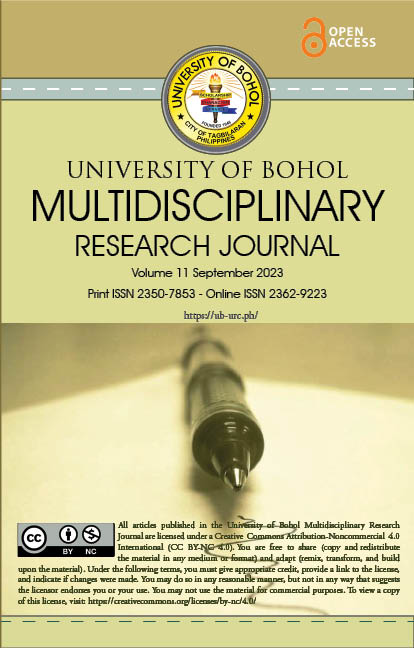Research Motivation, Engagement, And Productivity of College Instructors, University of Bohol, City of Tagbilaran
DOI:
https://doi.org/10.15631/t7qtvj41Keywords:
research productivity, research motivation, research engagement, quantitative-correlational, University of BoholAbstract
Research productivity in higher education institutions plays a vital role in achieving the goals of the institution. These institutions consider the teaching faculty as the primary producers of research in a university. Thus, it would be beneficial for the institution to find out the teaching faculty’s motivation to engage in academic research and determine the factors influencing their research productivity to enhance the institution’s efforts in cultivating quality and quantity research outputs. The study aims to investigate the research motivation, engagement, and research productivity of the college instructors at the University of Bohol. The researcher utilized a quantitative descriptive method using a researcher-made tool in which items were based on an intensive reading of theories, studies, and related literature. The tool underwent pretesting and possessed a high-reliability value based on its computed Cronbach a of .895. The respondents of the study were regular college instructors at the University of Bohol. The respondent’s profile, level of intrinsic and extrinsic motivation, level of research engagement, and status on research productivity were subjected to statistical treatment for analyses. The results show that respondents have higher intrinsic than extrinsic motivation. In addition, educational attainment was a consistent variable that significantly relates to the respondents’ research motivation, engagement, and productivity. The result implies that the level of research motivation, engagement, and research productivity level is dependent on one’s educational attainment. On the other hand, the factors that hindered the research engagement of the respondents were a lack of administration support and a full teaching load.
References
Adams, J. (1965). Inequity in Social Exchange’, in Berkovitz, L. (Ed.) Advances in Experimental Social Psychology, Vol.2. London: Academic Press. http://bit.ly/4dA37bD
Bandura, Albert (1977) Self-Efficacy: Toward a unifying theory of behavioral change. Psychological Review. https://bitly.cx/XPQT6
Bensimon, E.M., Ward, K., & Sanders, K. (2000). The department chair’s role in developing new faculty into teachers and scholars. Bolton: Anker https://eric.ed.gov/?id=ED443299
Downloads
Published
Issue
Section
License
Copyright (c) 2023 Emma Sanag-Rulona

This work is licensed under a Creative Commons Attribution-NonCommercial 4.0 International License.




